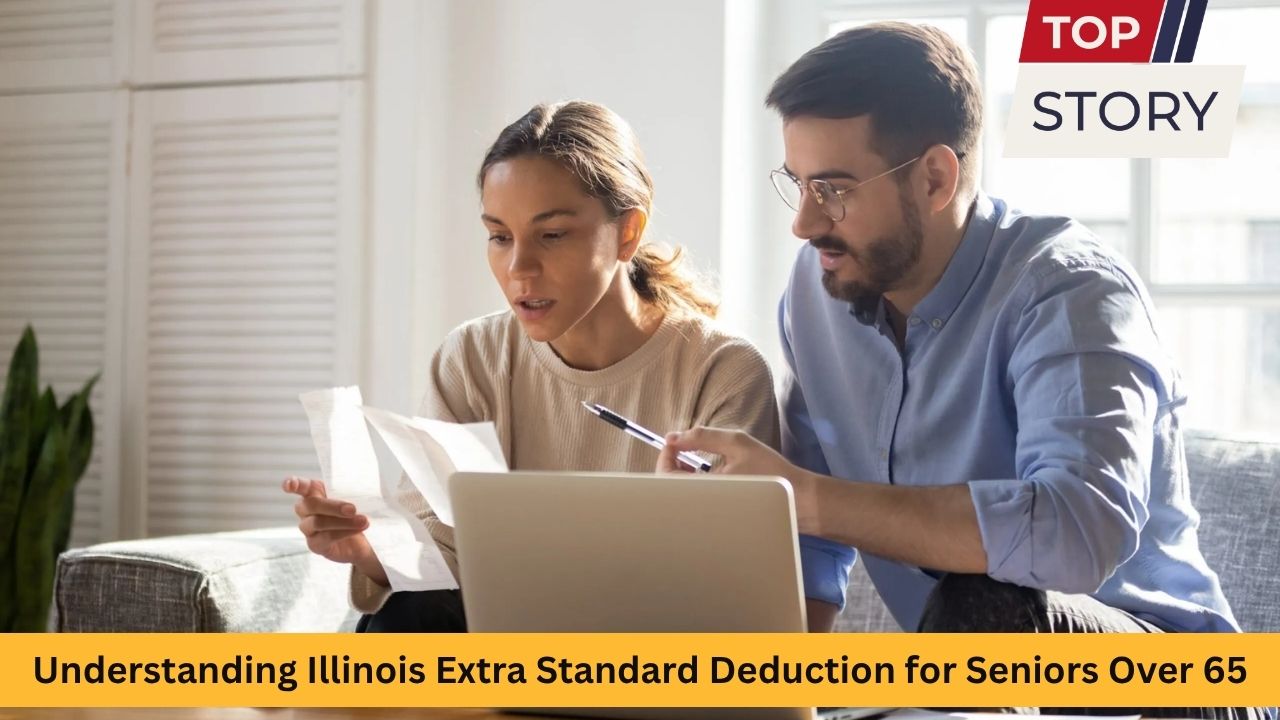Navigating tax matters as a senior in Illinois can feel overwhelming, but understanding the extra standard deduction available for those 65 and older unlocks meaningful opportunities for savings. As Illinois’ older population continues to rise, especially in vibrant cities like Chicago, Springfield, Rockford, Peoria, Naperville, and the rural heartlands, more residents stand to benefit from this crucial financial relief.
This comprehensive guide will clarify how the extra standard deduction works for Illinois seniors, highlight related programs like property tax breaks, and provide statistics and facts to illustrate its impact across the state.
The Demographic Shift: Illinois Seniors in the Spotlight
Illinois’ population is aging at a rapid pace. Currently, about one in every five residents will be 65 or older by 2030—a figure projected to keep rising. Cities such as Aurora, Bloomington, and Evanston, along with counties like Lake and DuPage, are seeing increasing numbers of older adults, shaping local policy and resource demands.
- By 2040, the number of Illinoisans between ages 65 and 84 is expected to double.
- Over one million seniors currently call the Chicago metro area home.
- Hamilton, McLean, and Kane counties report some of the highest proportions of residents aged 65+.
- Rural communities like those in Hamilton County often have a greater percentage of older adults than urban counterparts.
This surge means more need for housing, health care, transportation, and crucially, tax relief—making programs such as the extra standard deduction more essential than ever.
What Is the Extra Standard Deduction for Seniors Over 65?
The extra standard deduction is an addition to the base standard deduction, designed specifically to help reduce the taxable income burden for older adults. When filing both federal and Illinois state taxes, seniors over the age of 65 can claim an increased deduction, lessening the overall amount of tax owed.
For the 2025 tax year:
- Single filers 65 or older receive an additional $2,000 on top of the regular standard deduction.
- Married couples, if both are 65 or older and filing jointly, can claim $1,600 each as an extra deduction, totaling $3,200.
- If a filer is both 65+ and legally blind, the additional deduction is doubled.
This adjustment is automatically available to qualifying seniors—no special action is required apart from checking the appropriate boxes on your Illinois tax forms.
How the Extra Deduction Combines with the Standard Deduction
To grasp the benefits, consider a resident of Rockford filing as head of household:
- Base standard deduction: $21,900 (for 2024), with slight annual adjustments for inflation.
- If aged 65 or older by year’s end, add $2,000, making the total standard deduction $23,900.
For joint filers in Springfield, both aged over 65:
- Base deduction: $29,200
- Extra deduction combined: $3,200
- Total deduction: $32,400
This approach significantly reduces the income subject to taxation, supporting seniors who may be living on more modest or fixed incomes.
Who Qualifies for the Extra Deduction?
Illinois residents are eligible for this benefit if:
- They are aged 65 or older by the last day of the tax year.
- They file either individually or jointly (spouses can both qualify if each meets the age criteria).
- The deduction applies regardless of whether a senior is working, retired, or receiving Social Security.
Example: In Peoria, a married couple with both partners 67 years old will maximize the available deduction. If one spouse is 64 and the other 68, only the older spouse qualifies for the extra amount.
The Impact Across Illinois Cities and Counties
The extra deduction yields tangible annual savings. For instance:
- In Chicago, where the cost of living is higher, the extra deduction can mean more money in seniors’ pockets for groceries, rent, or utilities.
- In rural areas such as Hamilton or Carroll Counties, where median incomes are lower, this deduction can cover the cost of essentials like transportation or medications.
- Suburban communities like Naperville and Aurora, with rapidly aging populations, benefit as property taxes and living expenses rise.
Additional Tax Relief Options in Illinois
Senior Citizen Homestead Exemption
Illinois provides a homestead exemption for seniors that reduces the assessed value of a primary residence:
- Must be 65 or older by December 31 of the tax year.
- The exemption amount varies by county, often saving hundreds annually.
- Especially helpful in cities like Wheaton, Elmhurst, and Galesburg with high property tax burdens.
Senior Citizens Real Estate Tax Deferral Program
This program allows eligible seniors to defer up to $7,500 annually in property taxes:
- Must be 65+ before June 1 of the filing year.
- Income must not exceed $65,000 annually.
- Must have owned and lived in the property for at least three years.
Helpful in areas with high property tax rates like Cook County, and in rural areas where cash flow is tight.
Local Programs and Incentives
Municipalities such as Joliet, Decatur, and Skokie offer additional aid, including:
- Utility payment assistance
- Transportation vouchers
- Home modification grants
These programs aim to help older residents stay independent and safe in their homes.
The Financial Picture for Illinois Seniors
Illinois seniors are increasingly reliant on fixed incomes:
- Nearly two-thirds report difficulty saving money.
- Sixty percent worry about having enough in retirement.
- 77% carry some form of debt, mostly credit cards or mortgages.
These realities make every bit of tax relief—like extra deductions and exemptions—more meaningful.
Real-World Examples: Seniors Leveraging Tax Breaks
Mary, 70, in Springfield, benefits from the extra deduction, reducing her tax burden and helping her cover heating costs in winter.
Bob and Linda, 67-year-old Joliet residents, used both the homestead exemption and the standard deduction to fund home repairs.
Gloria, 80, in Peoria, deferred property taxes through the Real Estate Tax Deferral Program, ensuring she could afford to stay in her long-time home.
Tips for Maximizing Benefits
- Check the “Over 65” box on your IL-1040 form.
- Explore eligibility for your spouse as well.
- Research local exemptions, as counties may offer extras.
- Use free tax counseling, available in cities like Chicago and Rockford.
- Apply early—property tax relief often has March deadlines.
- Stay updated—deduction amounts can change annually with inflation.
The Economic and Social Benefits to Communities
Tax breaks for seniors help communities in multiple ways:
- Better health from reduced stress benefits healthcare systems in cities like Decatur and Carbondale.
- Increased spending boosts local businesses in Schaumburg and Oak Park.
- Stable neighborhoods emerge when seniors can age in place, from Waukegan to Alton.
Addressing Challenges: Accessibility and Awareness
Many seniors miss out on benefits due to lack of awareness. Outreach efforts are expanding across the state:
- Tax clinics in neighborhoods from Chicago to Quincy
- Winter mailings in Springfield and Bloomington
- Digital resources and hotline numbers promoted by state agencies and nonprofits
The Future Outlook: An Aging Illinois
As Illinois continues to age:
- Urban hubs like Chicago will face infrastructure and housing challenges.
- Smaller cities like Freeport and Carbondale must stretch limited resources.
- Policymakers must adapt tax laws and ensure accessibility.
Investing in affordable housing, accessible transit, and robust financial support systems will be key to creating a senior-friendly Illinois.
Commonly Asked Questions
Do I have to be fully retired to qualify?
No. If you’re 65 by the end of the year, you’re eligible—working or not.
If I turn 65 during the tax year, am I eligible?
Yes. As long as you’re 65 by December 31.
My spouse and I file jointly, but only one of us is over 65. What can we claim?
You can claim the extra deduction for the qualifying spouse only.
What documentation is needed?
No extra paperwork for income tax—just mark the form. For property tax relief, age and residency documents may be required.
Can I use the deduction for second homes?
No. Tax relief programs apply only to your primary residence.
Resources for Seniors
- County tax assessor offices in Cook, Sangamon, and Winnebago counties
- Community agencies in Moline, Rock Island, and Galesburg
- Nonprofits offering legal and tax help across urban and rural areas
- Public libraries hosting free seminars each spring
Conclusion
Illinois’ extra standard deduction for seniors over 65 is a cornerstone of financial relief, providing vital support amid rising costs and changing demographics. Whether in fast-paced Chicago or quieter towns like Princeton or Harrisburg, taking advantage of all available deductions and exemptions is crucial to long-term financial stability.
By staying informed and proactive, Illinois seniors can enjoy the comforts of home, stay active in their communities, and age with security and dignity.











Leave a Comment